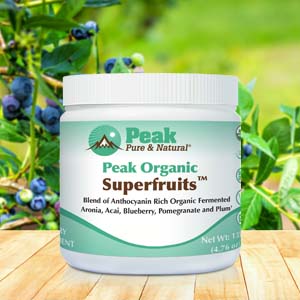Blueberries continue to give up their secrets as to why they’re one of the most celebrated — and maybe the first — of the superfoods.
They’re most revered for their reputation in supporting heart and brain health. That’s because they contain a powerful antioxidant that rivals resveratrol, called pterostilbene.
But as researchers dig deeper into the little round wonders, they’re learning more every day — including how they can support the gut against painful and debilitating conditions by going after their root cause…
Blueberries soothe inflammatory bowel symptoms
Blueberries, like some other dark blue and purple foods, are chock-full of anthocyanins — a special group of polyphenols well-known for preventing the damaging inflammation behind so many diseases, including gut-related conditions like hemorrhoids, colitis, and irritable bowel syndrome (IBS).
In a recent study, researchers have been able to pinpoint exactly how anthocyanins support the gut by zeroing in on a common anthocyanin known as malvidin-3-O-galactoside (M3G).
In studies using mice, the scientists found that M3G regulated key proteins that enhance the protective function of the colon’s mucosal barrier.
This mucosal barrier is essential for maintaining digestive health, protecting against pathogens, and preventing inflammation. When it’s damaged the colon can become an open door for leaky gut syndrome.
The scientists were able to mimic the symptoms of ulcerative colitis in mice and then treated some of the mice with M3G.
Supplementing with M3G increased mucous thickness, which indicated an improvement in the intestinal barrier’s function. Food intake in the mice improved and their body weight significantly increased, a sign that it was having a protective effect against colitis symptoms.
Cell-to-cell communication that protects the colon
Another interesting benefit from supplementing with the anthocyanin was the regulation of something called the Notch signaling pathway, a cell-to-cell communication system that controls many cellular processes.
The Notch pathway is crucial in determining the life cycle of cells, including cell maintenance, renewal, proliferation and apoptosis (natural cell death). This means the pathway can also promote and inhibit tumor development.
Upon deeper analysis, the scientists found evidence that much of the regulation of the colonic barrier is mediated through its interaction with this pathway.
Blueberries for your gut’s sake
As if this superfood’s reputation wasn’t strong enough, the research clearly demonstrates the dietary anthocyanins they contain enhance the integrity of the colon’s barrier — suggesting its potential as a natural therapeutic agent for intestinal health, researchers say.
If you follow nutritional health like I do, none of this is really surprising. Blueberries have already been found to help lower blood pressure and reduce risks for cognitive decline.
And in some studies that focused on the compounds responsible for their health-promoting properties, they’ve found eating the berries in their entirety was most beneficial.
How ever you choose to enjoy them, adding a cup of blueberries to your daily diet could lead to benefits too numerous to count.
Best of all, blueberries are considered a low-glycemic food, ranking around 53 on the glycemic index (GI) scale. They won’t give you a “sugar high,” but they sure are sweet!
Sources:
Blueberry-derived compound shows promise in enhancing colonic mucosal Barrier function — Eureka Alert
Malvidin-3-O-galactoside ameliorates colonic mucosal barrier function via the Notch signaling pathway — Food Innovations and Advances
Recent Research on the Health Benefits of Blueberries and Their Anthocyanins — Journal Advances in Nutrition
Read full article here




